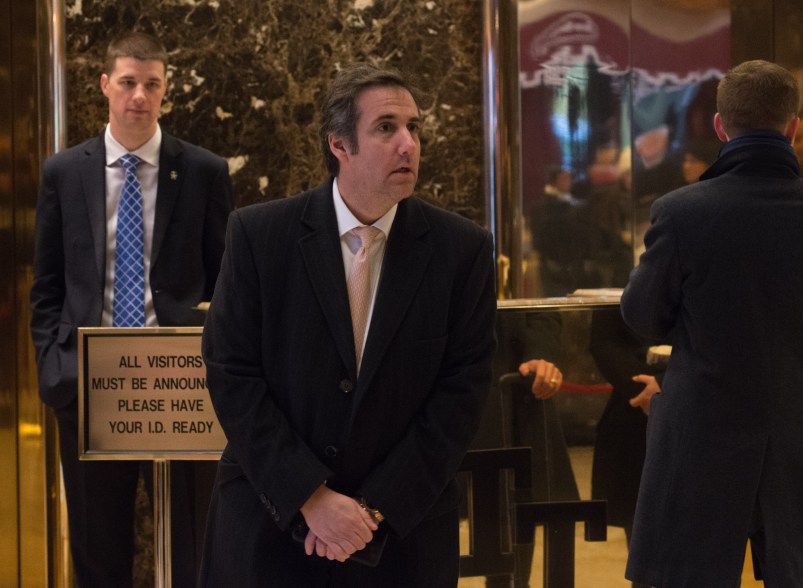Among the many juicy details in Michael Cohen’s blockbuster weekend interview with ABC News was one key piece of information: Cohen is ending his joint defense agreement with President Trump.
As legal experts noted, former national security adviser Michael Flynn took the same step shortly before he flipped and agreed to cooperate with the federal investigation into Russia’s election interference.
But unlike Flynn, Cohen went on cable news to publicly telegraph his break with Trump, raising the question of what statement he is trying to make.
The consensus seems to be that Cohen is in fact planning to cooperate with the New York prosecutors investigating his business dealings, or that he is angling for a presidential pardon by signaling to his former boss that his allegiance is conditional.
“He’s certainly trying to give the impression that he will flip,” former federal prosecutor Renato Mariotti told TPM.
Cohen’s shift in tone and behavior is palpable. After federal agents first raided Cohen’s premises in early April and seized documents, hard drives, and electronic devices, Trump reportedly called Cohen to “check in” and Cohen insisted he’d remain faithful to Trump.
But when the President began to distance himself from his longtime personal attorney, reports circulated that Cohen felt abandoned and photos circulated of him palling around with Trump foes like actor Tom Arnold.
Cohen made his loyalties explicit in his ABC interview, saying his foremost obligations were to his family and “country,” and that he would “not be a punching bag as part of anyone’s defense strategy.”
For the first time, Cohen also hinted that he had information on Trump’s involvement in two key issues of interest to federal prosecutors. One is the Trump Tower meeting between 2016 campaign officials and Russians promising “dirt” on Hillary Clinton, which is a subject of Special Counsel Robert Mueller’s probe. The other is the $130,000 Cohen paid to Stormy Daniels in October 2016 to keep her from talking about her alleged affair with Trump, one of the topics key to the New York criminal investigation into Cohen.
Asked whether Trump had prior knowledge of both events, Cohen demurred, saying that he couldn’t comment on advice of his counsel.
Cohen recently dramatically shook up his legal team, parting ways with his attorneys at McDermott, Will and Emery and bringing on Guy Petrillo, a former prosecutor in the U.S. Attorney’s office for the Southern District of New York. Notably, former Trump campaign aide Rick Gates brought a prominent white-collar attorney onto his defense team before agreeing to cooperate with Mueller’s investigation.
As the ABC report noted, Cohen’s team at McDermott was in a joint defense agreement with Trump’s legal team, led by Joanna Hendon of Spears Imes, allowing them to share information and documents with each other. Cohen, Trump and the Trump Organization had split the hefty costs of having an independent third-party, known as a special master, conduct a review of the documents the FBI seized from Cohen to filter out those covered by attorney-client privilege.
Joint defense agreements typically allow co-defendants whose legal interests align to work closely together and ensures that a form of attorney-client privilege known as “common interest doctrine” covers all of their interactions. Ending such an agreement is a notable step, suggesting that Petrillo may want to move forward with a new strategy.
Hendon, Petrillo and Cohen’s team at McDermott did not respond to TPM’s Monday requests for comment.
Mariotti, the former federal prosecutor, said that a defense lawyer “wouldn’t end an agreement like that unless they had a good reason.”
“If their interests are not aligned, the exchange of information between them is not protected by common interest doctrine and thus they’re going to waive privilege every time they talk to teach other,” Mariotti said. “So the right thing to do as a lawyer in a defense team is to be very upfront about the potential desire to flip, because otherwise you’re really harming the other defense team and you can create a lot of problems.”
Still, Mariotti and other legal observers were suspicious that such a close ally of the President would now so publicly hint that he might turn on him. Mariotti suggested that Cohen could be “angling for a pardon from Trump,” and former Justice Department spokesperson Matt Miller called the TV interview “a not-so-subtle request for a pardon.”
Trump has made it clear that he takes a liberal view towards executive clemency, granting pardons to high-profile individuals like former Arizona sheriff Joe Arpaio and former White House adviser Scooter Libby.
Asked in late April if he would pardon Cohen, Trump angrily brushed off the “stupid question.”
Asked again in mid-June, he said, “It’s certainly far too early to be thinking about that. They haven’t been convicted of anything. There’s nothing to pardon.”







Problem for tRump, and Mikey, is that a pardon doesn’t remove jeopardy for New York crimes, unless it’s issued after the trial starts, when jeopardy has attached. (New York Democrats were trying to remove that wrinkle, but I didn’t hear whether they did before the end of the session last month.)
Cohen puts Family first.
Then country.
After those come his wife and kids.
And then America.
Trump’s a distant fifth.
“Trump has made it clear that he takes a liberal view towards executive clemency …”
Nice analysis, Allegra, but I really don’t think “liberal” is the word you’re looking for there.
Cohen himself probably hasn’t decided. He’s shouting now, but it’s still aimed at an audience of one.
He did it because it gives him the option to cooperate. His former lawyers could not have gone down that road, because their loyalties were divided between Trump and Cohen. The change in lawyers does not mean that Cohen HAS flipped, it means he now COULD flip.